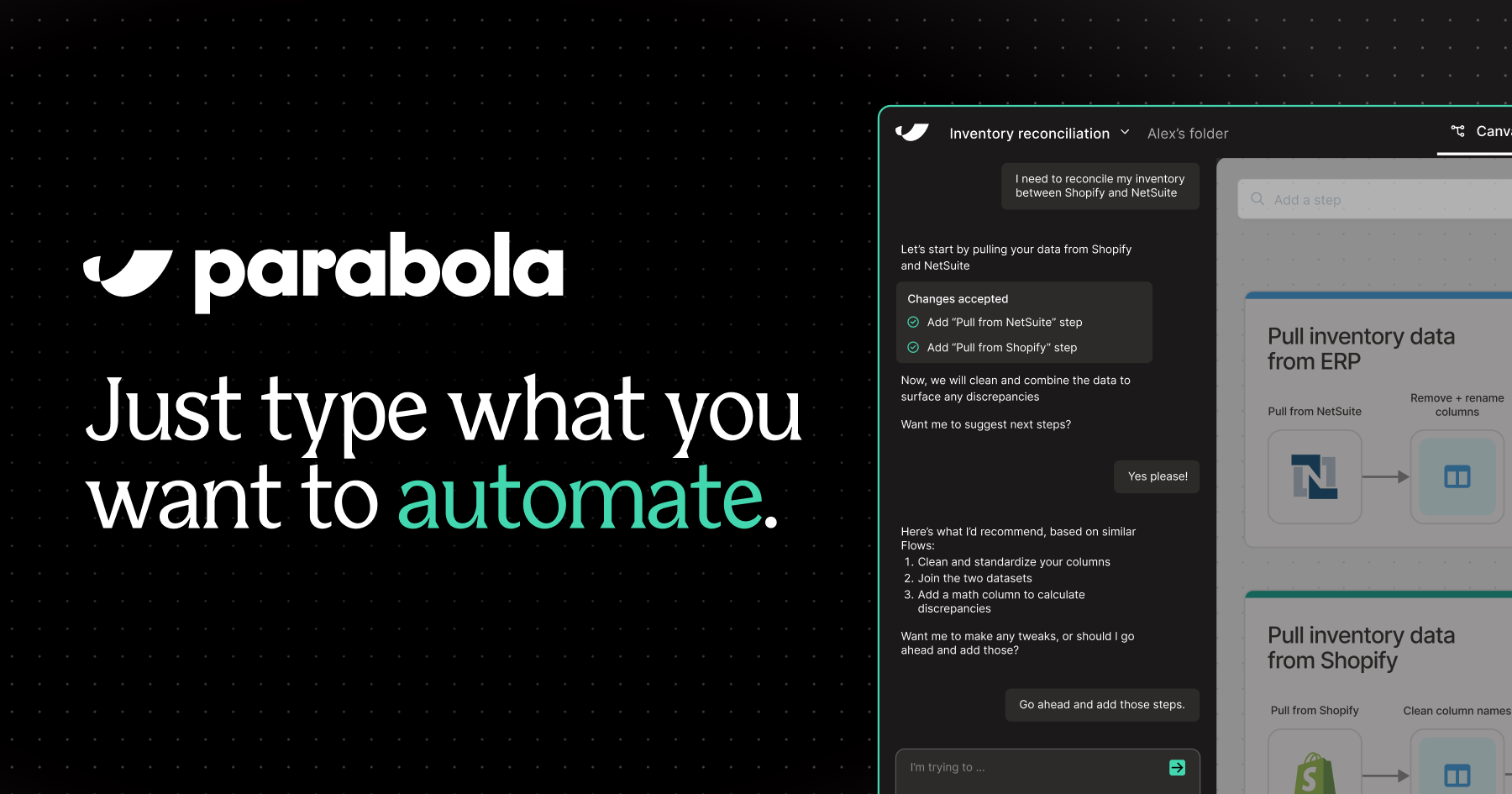- ETL processes are fundamental to data-driven operations, enabling real-time visibility and proactive decision-making
- Effective ETL implementation requires monitoring key metrics including data accuracy, processing time, and system integration efficiency
- Organizations face significant challenges with data quality, integration complexity, and system compatibility
- Traditional solutions like PowerCenter and Talend offer robust features but require extensive technical expertise and long implementation times
- Cloud-native and self-service platforms provide accessibility but may struggle with scalability and cost efficiency
- Parabola simplifies ETL through AI-powered workflows, quick integration, and automated data processing without technical complexity
Why is ETL crucial for business success?
ETL processes form the foundation of data-driven operations, with high-performing organizations achieving 45% better decision-making accuracy through automated data integration. Leading companies leverage ETL to maintain real-time visibility across their operations, enabling proactive strategy adjustments and performance optimization.
How can you measure ETL effectiveness?
Key performance indicators
Successful ETL implementation goes beyond basic data transfers. Top-performing companies track metrics like:
- Data accuracy rates (targeting 99.9% accuracy)
- Processing time reduction (average 65% improvement)
- System integration efficiency
- Data quality scores
- Real-time reporting capabilities
Critical success factors
- Cross-platform data standardization
- Integration completeness
- Processing speed and reliability
- Error handling effectiveness
- System scalability
What challenges do organizations face with ETL implementation?
Data quality issues
Multiple data sources create inconsistencies in format, accuracy, and completeness. This fragmentation often leads to delayed insights and incorrect reporting. Without proper ETL processes, organizations struggle to maintain reliable business intelligence.
Integration complexity
Manual data processing consumes excessive resources and creates operational delays. As business complexity grows, these inefficiencies become more critical. Automated ETL helps organizations scale their data integration without proportionally increasing costs.
System compatibility
Legacy systems and varied data formats challenge seamless integration. Organizations need robust ETL solutions that can handle diverse data sources while maintaining data integrity.
Leading ETL tools
Informatica PowerCenter
Enterprise-grade ETL platform offering comprehensive data integration capabilities. PowerCenter provides robust transformation features and extensive connectivity but requires significant technical expertise.
The platform excels at complex enterprise operations. However, implementation typically takes 3-6 months, and organizations need dedicated technical teams. Custom workflows require additional development resources.
Talend
Open-source data integration platform with broad connectivity options. While offering strong community support, Talend's technical complexity can overwhelm smaller teams.
Users praise its flexibility but struggle with performance optimization and maintenance overhead. Enterprise features require premium licensing.
AWS Glue
Cloud-native ETL service with serverless architecture. AWS Glue offers seamless integration with Amazon services but can be costly for high-volume processing.
The platform provides excellent scalability but faces challenges with hybrid deployments. Limited support for non-AWS sources restricts versatility.
Alteryx
Self-service data analytics platform with built-in ETL capabilities. While offering intuitive interfaces, Alteryx's pricing model can be prohibitive for growing organizations.
Organizations appreciate its visual workflow builder but face challenges with large-scale deployments. Advanced features require significant investment, prompting many companiies to consider alternatives.
Fivetran
Cloud-based ELT platform focusing on automated data pipelines. Fivetran delivers rapid deployment but offers limited transformation capabilities.
The platform excels at data loading but struggles with complex transformations. Pricing scales sharply with data volume.
How to implement ETL in your organization
- Identify critical data sources
- Map data relationships and dependencies
- Define transformation rules
- Establish quality control measures
- Set up monitoring systems
- Test integration processes
- Deploy and validate
- Monitor and optimize
ETL implementation best practices
- Establish clear data governance policies
- Create standardized transformation rules
- Implement robust error handling
- Schedule regular system audits
- Document all processes
- Maintain version control
How Parabola streamlines ETL processes
Parabola is an AI-powered workflow builder that simplifies enterprise data integration, transforming complex ETL processes into streamlined operations.
Quick setup and integration
Connect your business data sources to Parabola in minutes using pre-built connectors. Import data from any source—including legacy systems and spreadsheets—without complex technical setup.
Automated data processing
Transform your ETL operations with Parabola's drag-and-drop workflow builder:
- Automatically standardize data formats
- Flag quality issues based on custom rules
- Generate alerts for processing errors
- Create audit trails for all transformations
Real-time monitoring and reporting
Build custom dashboards that track:
- Data processing efficiency
- Quality metrics
- Integration success rates
- System performance indicators
Ready to transform your business data integration? Get started with Parabola and eliminate manual data processing today.

